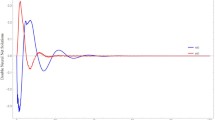Abstract
In this paper, the global exponential stability in Lagrange sense for neutral type neural networks with mixed time-varying delays is studied. By constructing proper Lyapunov functions and using inequality techniques, new delay-dependent succinct criteria are derived to ensure the global exponential Lagrange stability for the aforementioned neural networks. Meanwhile, globally exponentially attractive sets are given out. The results obtained here are more general than some of existing results. Finally, two examples are presented and analyzed to validate our results.


Similar content being viewed by others
Explore related subjects
Discover the latest articles, news and stories from top researchers in related subjects.References
Dhamala M, Jirsa V, Ding M (2004) Enhancement of neural synchrony by time delay. Physical Rev Lett 92(074104):1–4
Chua L, Yang L (1988) Cellular neural networks: theory. IEEE Trans Circ Syst 35(10):1257–1272
Xu S, Lam J (2006) A new approach to exponential stability analysis of neural networks with time-varying delays. Neural Networks 19(1):76–83
Cao J, Wang J (2005) Global asymptotic and robust stability of recurrent neural networks with time delays. IEEE Trans Circ Syst I: Regular Papers 52(2):417–426
Zeng Z, Wang J, Liao X (2005) Global asymptotic stability and global exponential stability of neural networks with unbounded time-varying delays. IEEE Trans Circ Syst II Express Briefs 52(3):168–173
Song Q (2008) Exponential stability of recurrent neural networks with both time-varying delays and general activation functions via LMI approach. Neurocomputing 71:2823–2830
Hu J, Wang J (2012) Global stability of complex-valued recurrent neural networks with time-delays. IEEE Trans Neural Networks Learning Syst 23(6):853–865
Song Q, Zhao Z (2016) Stability criterion of complex-valued neural networks with both leakage delay and time-varying delays on time scales. Neurocomputing 171:179–184
Lu W, Chen T (2004) Synchronization of coupled connected neural networks with delays. IEEE Trans Circ Syst Part I: Regular Papers 52(12):2491–2503
Nie X, Zheng W (2015) Multistability of neural networks with discontinuous non-monotonic piecewise linear activation functions and time-varying delays. Neural Networks 65:65–79
Li T, Luo Q, Sun C, Zhang B (2009) Exponential stability of recurrent neural networks with time-varying discrete and distributed delays. Nonlinear Anal Real World Appl 10:2581–2589
Cao J, Yuan K, Ho DW, Lam J (2006) Global point dissipativity of neural networks with mixed time-varying delays. Chaos 16(013105):1–9
Lakshmanan S, Senthilkumar T, Balasubramaniam P (2011) Improved results on robust stability of neutral systems with mixed time-varying delays and nonlinear perturbations. Appl Math Model 35:5355–5368
Samidurai R, Marshal S (2010) Anthon, K. Balachandran. Global exponential stability of neutral-type impulsive neural networks with discrete and distributed delays. Nonlinear Anal Hybrid Syst 4:103–112
Song Q, Zhao Z, Liu Y (2015) Impulsive effects on stability of discrete-time complex-valued neural networks with both discrete and distributed time-varying delays. Neurocomputing 168:1044–1050
Kuang Y (1993) Delay differential equations with applications in population dynamics. Academic Press, Boston
Brayton R (1966) Bifurcation of periodic solutions in a nonlinear difference-differential equation of neutral type. Quarterly Appl Math 24:215–224
Arik S (2014) An analysis of stability of neutral-type neural systems with constant time delays. J Franklin Inst 351:4949–4959
Luo Q, Zeng Z, Liao X (2011) Global exponential stability in Lagrange sense for neutral type recurrent neural networks. Neurocomputing 74:638–645
Jian J, Wang B (2015) Stability analysis in Lagrange sense for a class of BAM neural networks of neutral type with multiple time-varying delays. Neurocomputing 149:930–939
Yi Z, Tan K (2004) Convergence analysis of recurrent neural networks. Kluwer Academic Publishers, Dordrecht
Liao X, Luo Q, Zeng Z (2008) Positive invariant and global exponential attractive sets of neural networks with time-varying delays. Neurocomputing 71:513–518
Liao X, Luo Q, Zeng Z, Guo Y (2008) Global exponential stability in Lagrange sense for recurrent neural networks with time delays. Nonlinear Anal Real World Appl 9:1535–1557
Wu A, Zeng Z (2014) Lagrange stability of memristive neural networks with discrete and distributed delays. IEEE Trans Neural Networks Learning Syst 25(4):690–703
Wu A, Zeng Z (2014) Lagrange stability of neural networks with memristive synapses and multiple delays. Information Sci 280:135–151
Zhang G, Shen Y, Xu C (2015) Global exponential stability in a Lagrange sense for memristive recurrent neural networks with time-varying delays. Neurocomputing 149:1330–1336
Li L, Jian J (2015) Exponential convergence and Lagrange stability for impulsive Cohen-Grossberg neural networks with time-varying delays. J Comput Appl Math 277:23–35
Tu Z, Cao J, Tasawar H (2016) Global exponential stability in Lagrange sense for inertial neural networks with time-varying delays. Neurocomputing 171:524–531
Boyd S, Ghaoui L, Feron E, Balakrishnan V (1994) Linear matrix inequalities in system and control theory. Society for industrial and applied mathematics, Philadelphia
Wang X (2015) Uncertainty in learning from big data-editorial. J Intell Fuzzy Syst 28(5):2329–2330
Lu S, Wang X, Zhang G, Zhou X (2015) Effective algorithms of the Moore-Penrose inverse matrices for extreme learning machine. Intell Data Anal 19(4):743–760
Wang X, Ashfaq R, Fu A (2015) Fuzziness based sample categorization for classifier performance improvement. J Intell Fuzzy Syst 29(3):1185–1196
He Y, Wang X, Huang J (2016) Fuzzy nonlinear regression analysis using a random weight network. Info Sci. doi:10.1016/j.ins.2016.01.037 (in press)
Ashfaq R, Wang X, Huang J, Abbas H, He Y (2016) Fuzziness based semi-supervised learning approach for intrusion detection system (IDS). Information Sci. doi:10.1016/j.ins.2016.04.019 (in press)
Acknowledgments
This work was jointly supported by the National Natural Science Foundation of China under Grant No. 61174216, the Scientific and Technological Research Program of Chongqing Municipal Education Commission under Grant Nos. KJ1501002 and KJ1401003, and the Youth Fund of Chongqing Three Gorges University under Grant No. 14QN22.
Author information
Authors and Affiliations
Corresponding author
Rights and permissions
About this article
Cite this article
Tu, Z., Wang, L. Global Lagrange stability for neutral type neural networks with mixed time-varying delays. Int. J. Mach. Learn. & Cyber. 9, 599–609 (2018). https://doi.org/10.1007/s13042-016-0547-6
Received:
Accepted:
Published:
Issue Date:
DOI: https://doi.org/10.1007/s13042-016-0547-6





